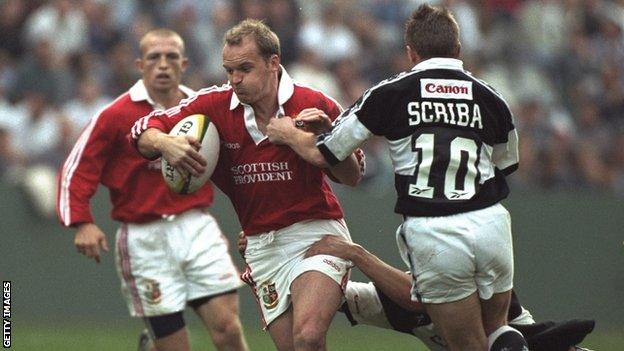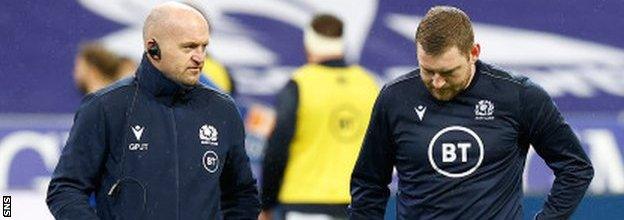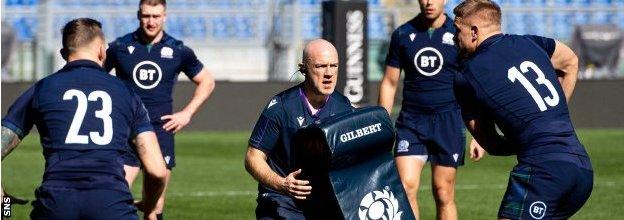Gregor Townsend - Scotland's Lions inside track to brutally difficult decisions
- Published

Gregor Townsend played on the 1997 British and Irish Lions tour to South Africa
In the dying seconds of the second Lions Test against South Africa in 1997, Gregor Townsend carried the ball to within spitting distance of the Springbok try line.
In those frenzied seconds, with the tourists looking for any kind of score to win the series, he had a decision to make - and not a lot time in which to make it.
"It was one of those moments where you're kind of spinning and pumping the legs and I wondered about whether to try and lunge for the line," he said.
"In a previous season for a different team, I might have tried to lunge and hope my strength could get me over. But, in a situation like that, you don't go for the risky play; you can't have the Test series decided on a selfish act like that, so I set up the ball."
His set-up would lead to Matt Dawson's pass to Jerry Guscott and to the most famous drop-goal in Lions history. As options go, he chose the right one. And now the Scotland head coach has become a decision-maker again for the Lions.
Twenty-four years on, he's going back to South Africa as an assistant coach under Warren Gatland. He'll have another member of the Scottish coaching staff for company, with Steve Tandy also on the ticket as defence coach.
It would be unwise to think that more coaches from the Scotland camp automatically means there will be a raft of Scottish players in the final squad - even if Gatland made positive noises on Tuesday - but at least those guys in contention will have two people in the room who can give an insider's appraisal of their worth.
That wasn't the case for the trip to New Zealand in 2017. Four years ago, Townsend turned down the chance to be one of Gatland's assistants, preferring, sensibly, to go on tour with a Scotland squad he'd just inherited from Vern Cotter. The four years that followed have been eventful, to put it mildly.
In the early days, Townsend won home and away Tests against Australia and then beat England at Murrayfield with a display of sensational attacking rugby, inspired by Finn Russell. At that point, spring 2018, there was talk he might well be the next Lions head coach, but everything turned in 2019.
The Six Nations was poor, the World Cup poorer still. Scotland, a hopelessly soft touch in defence, exited early and it sparked a massive bout of introspection.
In the midst of Townsend changing his coaches and his philosophy from wanting to play rugby based on speed to wanting to play rugby based on belligerent defence, Russell walked out.
He cited the environment in camp as one of the reasons why he couldn't operate under his coach any longer. Russell eviscerated Townsend.
Those weeks and months were brutally hard for the former Lion, but he managed it all coolly.
Townsend listened to his players, altered the way he was doing things, calmly began the process of Russell's repatriation and came out the other side in a stronger place with a more united squad of players.
He never wanted the crisis in the first place, but in terms of managing it when it came along, it was impressive work.

Gregor Townsend and Finn Russell have resolved their differences
Since the beginning of 2020, Townsend's team has won home and away against England and France, while also bringing to an end a run of failure in Wales that stretched back 18 years.
He's won six of his last 10 Six Nations matches. The four losses have been narrow ones - two by seven points, one by three and one by a single point.
In the 2020 Six Nations, Scotland's defence went from one of the worst across a span of two decades to the very best. The fact that Tandy got such a dramatically rapid reaction from his players was not lost on Gatland as he sought a man to run his defence.
The criticism then moved to Scotland's lack of tries and things improved there as well.
In 2021, they scored 18. In the 21 years since five nations became six, only Wales (2021), England (2019), Ireland (2018) and England (2002, 2001 and 2000) scored more than Scotland did this season.
Townsend is still striving for consistency, still looking to build the kind of mindset that has Scotland as contenders rather than a team that wins three from five but never threatens to win trophies. He's come a long way since Japan 2019 and the hubbub with Russell that followed though.
At 47, he's one of the youngest international coaches out there. Among the major nations, only Ireland's Andy Farrell is younger. There's a lot more to come and the Lions tour will only make Townsend a more knowledgeable operator.
Quite how influential he will be on selection is anybody's guess, but Townsend gets the Lions concept and there's not a chance in hell that he'll be arguing for Scots if he thinks there's a better option elsewhere.
That might cause difficulty later on with his own players who aren't picked, but it's part of what being a Lions coach is all about.
Gatland will have the last word. That's a get-out for him at least.

Steve Tandy has helped Scotland improve their defence
Some - many - of the decisions that have to be made are brutally difficult ones. Gatland named an initial squad of 41 in New Zealand. This time, the (as yet unconfirmed) word is that he might go for just 36 - and that only makes the process even tougher.
Some snapshots here. There's a massive case to be made for both Rory Sutherland and Zander Fagerson to be on the trip. Wyn Jones is favourite at loose-head and Tadhg Furlong is in the box-seat at tight-head, but the performances of the Scottish props puts them close behind. Or should.
On the flanks, the debate could last into the night. There could be five flankers. That's five between Tadhg Berne, Sam Underhill, Jamie Ritchie and Josh Navidi (blind-sides) and Hamish Watson, Tom Curry, Justin Tipuric and Josh van der Flier (open-side).
All are outstanding, all offer different things, some offer the versatility of being able to play across the back row. The margins between the chosen and unchosen are impossibly small in some cases.
A few months ago, Hugo Keenan, the Leinster and Ireland full-back, wouldn't have been on many shortlists. Now, on the back of an excellent Six Nations and a stellar showing against Exeter Chiefs in the Champions Cup at the weekend, he has to be making serious inroads.
If he comes in, then somebody goes out. Liam Williams is a certainty. Stuart Hogg will make it, won't he?
Chris Harris has to have a big chance at 13, and Sean Maitland and Duhan van der Merwe have a squeak on the wing, although they have Anthony Watson, Josh Adams, Louis Rees-Zammit, Jordan Larmour, Jonny May, Keith Earls and others as rivals. Probably only four of them will make it.
Oh to be a fly on the wall when the England boys, particularly the Saracens boys, are mentioned in the selection meeting. Beyond his reputation, and a brilliant goal-kicking boot, there isn't a compelling case for Owen Farrell.
There are better options in the midfield and Johnny Sexton, Dan Biggar and Finn Russell deserve to be picked ahead of him at 10. Gatland tends to move in mysterious ways though.
If fellow Saracen Mako Vunipola makes it, then he too would be in on reputation rather than anything that he's delivered this year. Jamie George the same. Ken Owens is the leading hooker, but the other two slots should be wide open if form is the principal factor.
Townsend, and Tandy, will now have a say on all of this. Scotland is crying out for involvement and, since the glory days of Townsend and Alan Tait and Tom Smith and the other heroes of 1997, this is Scotland's best opportunity to have proper representation on the trip.
A Scottish coach and a Welshman exiled in Edinburgh is not bad for starters.